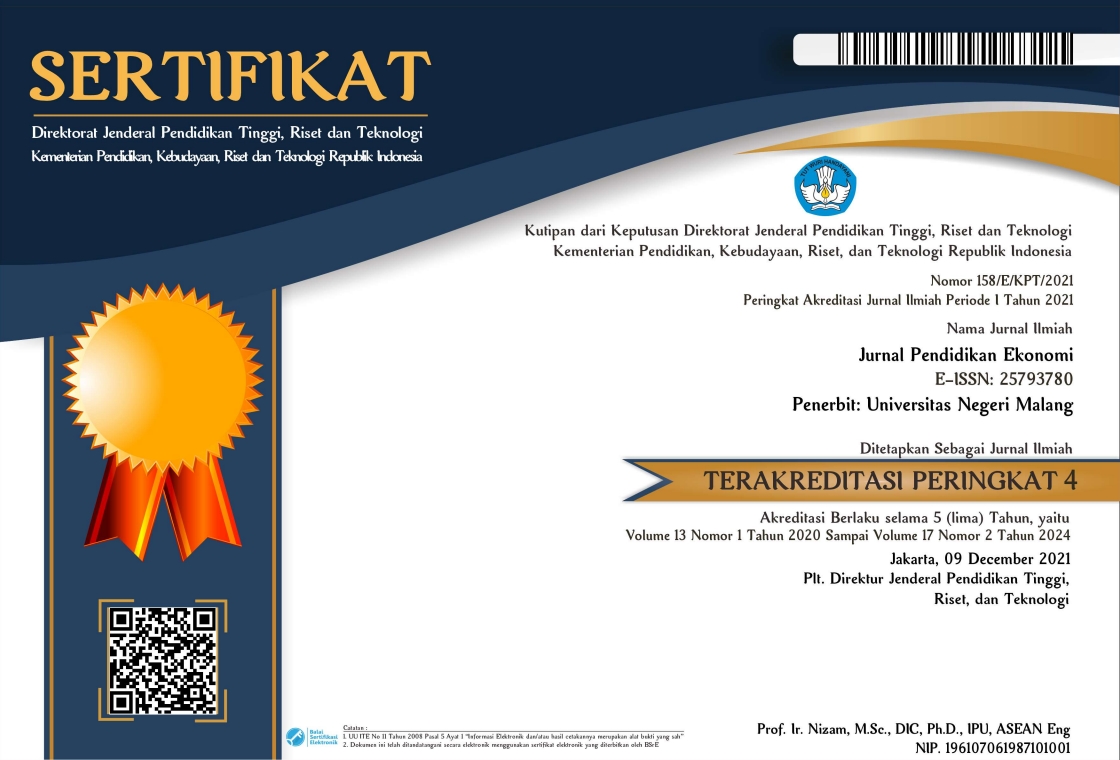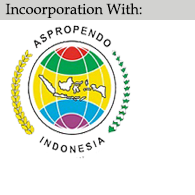Realitas Dan Kontradiksi Regulasi Guru Honorer Tahun 2023 di Indonesia
Abstract
This research intends to analyze student perceptions of the 2023 honorary teacher regulation in Indonesia and the motives behind their interest in becoming teachers towards the 2023 honorary teacher regulation in Indonesia. This research uses a qualitative approach with an intrinsic case study type of research. The subjects of this study were students of the economic education class of 2019, State University of Malang. The researcher chose this subject because based on preliminary studies and circulating issues related to the 2023 honorary teacher regulations in Indonesia that some 2019 economics education students are still interested in becoming teachers after the 2023 honorary teacher regulations in Indonesia. According to the results of interviews conducted with students of the economic education class of 2019 at the State University of Malang, there are five themes in student perceptions of the 2023 honorary teacher regulation in Indonesia, namely (1) Receiving stimuli or objects from outside the individual, (2) Knowledge related to the 2023 honorary teacher regulation , (3) Welfare for teachers and preparing professional teachers, (4) Evaluation of the 2023 honorary teacher regulation, (5) Suggestions for better changes. While the interviews were obtained on the motives behind the interest in becoming a teacher regarding the regulation of honorary teachers in 2023 in Indonesia, there are eight themes, namely (1) Having knowledge about the profession as a teacher, (2) Happy in the field as a teacher, (3) Interested in the profession as a teacher , (4) Attention to the profession as a teacher, (5) Having a desire to become a teacher, (6) Making efforts to become a teacher, (7) Confident in choosing a profession as a teacher, (8) Feeling comfortable with the teaching profession.
Keywords
Full Text:
PDFReferences
Ahmadi, Abu. (2009). Psikologi Umum. Jakarta: Rineka Cipta.
Al’afghani, M.M, & Bisariyadi (2021) “Konsep Regulasi Berbasis Risiko: Telaah Kritis Dalam Penerapannya Pada Undang-Undang Cipta Kerja.” Jurnal Konstitusi 18(1):066–090. doi: 10.31078/jk1814.
Ariadika, J P, & Purwaningsih, S.M (2019) “Minat Terhadap Profesi Guru Pada Mahasiswa Program Studi Pendidikan Sejarah Universitas Negeri Surabaya.” Avatara 7(3).
Astuti (2019) “Pengembangan Standar Profesional Guru Dalam Rangka Peningkatan Mutu Sumber Daya Manusia.” Didaktika 12(1):1. doi: 10.30863/didaktika.v12i1.172.
Astuti, M.O, Syamwil, & Susanti, D (2019) “Analisis Faktor Minat Mahasiswa Pendidikan Ekonomi Untuk Menjadi Guru Melalui Program Pendidikan Profesi Guru.” Jurnal Ecogen 1(4):766. doi: 10.24036/jmpe.v1i4.5655.
Yusman, D.A, & Ashar, F (2019) “Faktor – Faktor Yang Mempengaruhi Minat Menjadi Guru, Mahasiswa Program Studi Pendidikan Teknik Bangunan Fakultas Teknik Universitas Negeri Padang.” Cived 6(3). doi: 10.24036/cived.v6i3.106221.
Fajar, A.N (2022) “Minat Menjadi Guru (Studi Kasus Pada Mahasiswa Pendidikan Teknik Bangunan Universitas Negeri Jakarta Angkatan 2019).” Jurnal Pendidikan Tambusai 6(2):14078–85.
Hasanuddin (2019) “Persepsi Mahasiswa Terhadap Implementasi Uang Kuliah Tunggal Di Fakultas Ilmu Sosial Universitas Negeri Makassar Hasanuddin.” Repository Software Universitas Negeri Makasar (2).
Hidayah, S, & Wulandari, R.N.A (2022) “Pengaruh Persepsi Profesi Guru Dan Lingkungan Keluarga Terhadap Minat Mahasiswa Menjadi Guru Dengan Self Efficacy Sebagai Variabel Intervening.” JURNAL PAJAR (Pendidikan Dan Pengajaran) 6(4):992. doi: 10.33578/pjr.v6i4.8815.
Hurlock, E. B. (2010) Perkembangan Anak Jilid 2. (Terjemahan dr. Med.Meitasari Tjandrasa dan Dra. Muslichah Zarkasih). Jakarta: Erlangga.
Nasrullah, M, Ilmawati, Sirajuddin, S, Risma N, & Rudi, S (2018) “Minat Menjadi Guru Pada Mahasiswa Program Studi Pendidikan Administrasi Perkantoran Fakultas Ilmu Sosial Universitas Negeri Makassar.” Jurnal Ad’ministrare 5(1):1–6.
Mulyasa, E (2016) Menjadi guru professional. Bandung: PT. RemajaRosdakarya.
Robbins, S. P., & Timothy, A.J (2015) Perilaku Organisasi. Jakarta: Salemba Empat.
Peraturan Menteri Keuangan Republik Indonesia.
Peraturan Pemerintah Nomor 49 Tahun (2018) Tentang Manajemen Pegawai Pemerintah dengan Perjanjian Kerja (PPPK).
Shaleh, Rahman, A & Wahab, Muhbib, A (2005) Psikologi Suatu Pengantar dalam Perspektif Islam. Jakarta: Prenada Media.
Slameto (2010) Belajar dan faktor-faktor yang mempengaruhinya. Jakarta: PT. Rineka Cipta
Sugiyono (2019) Metode Penelitian Kuantitatif, Kualitatif, R&D. Alfabeta.
Syah, M (2004) Psikologi Pendidikan dengan Pendekatan Baru. Bandung: PT Rosdakarya.
Sendhikasari, D (2020) “Penghapusan Tenaga Honorer Dan Dampaknya.” Info Singkat 12:Kajian singkat terhadap isu aktual dan strategis.
Zuhri, S, & Faiqoh, F (2021) “Pengaruh Kenyamanan Kerja Dan Kompetensi Profesional Guru Terhadap Kreatifitas Guru (Studi Empirik Kuantitatif Di SD Dan SMP Al-Azhar BSD, Tangerang Selatan).” Madani Institute Jurnal Politik, Hukum, Pendidikan, Sosial Dan Budaya 10(1):32–38.
Walgito, B (2010) Pengantar Psikologi Umum. Yokyakarta: Andi Offset.
Witherington, H. C. (1999) Psikologi Pendidikan. Jakarta : Aksara Baru
Refbacks
- There are currently no refbacks.

Jurnal Penddidikan Ekonomi is licensed under a Creative Commons Attribution-NonCommercial-ShareAlike 4.0 International License





